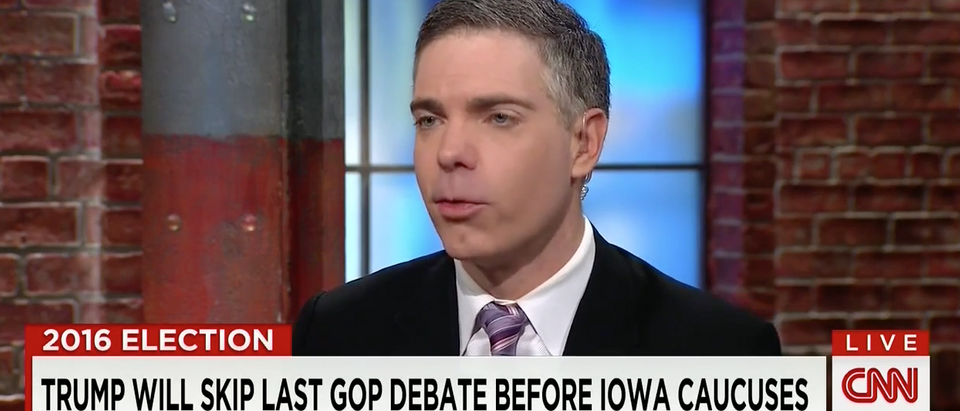People from where Matt Lewis comes from don’t grow up to become political commentators.
“If you told my dad or if you told me 20 years ago that I would be doing what I am doing today, it would be about like if you said, ‘you’re going to be starting shortstop for the Baltimore Orioles,'” he says in the latest episode of “The Jamie Weinstein Show” podcast. “It was about as absurd.”
In the podcast, The Daily Caller senior writer and CNN contributor discusses his path from flipping burgers at Roy Rogers to TV punditry, his advice for aspiring writers, his political influences and an amazing story about Republican communications expert Frank Luntz.
LISTEN:
Show Map:
- How “Real America” shaped Matt Lewis (3:02)
- Matt realizes flipping burgers is not for him (12:32)
- Matt’s political leap (14:24)
- Perhaps the greatest Frank Luntz story ever (24:50)
- Matt goes from political operator to political journalist (26:57)
- The peril of writers thinking of themselves as television personalities (34:00)
- Matt almost goes on TV as a medical expert (38:58)
- When Matt met Donald Trump (45:36)
- Matt discusses his influences (57:40)
You can Subscribe and Listen to the Podcast on iTunes, and be sure to leave me a Rating and Review!
In a town full of cookie cutter resumes, Lewis bucks the trend. Even though he grew up just an hour or so outside of D.C., he says it is culturally “a world away.”
“If you had worn, like, red pants in Frederick, Maryland you would have gotten your ass kicked,” Lewis jokes while explaining the difference between his hometown and the Beltway. “Not only would we not have done it, we didn’t know such a thing existed.”
Kids in his elementary school, Lewis says, dreamed of becoming farmers and truck drivers.
After graduating from Shepherd College, Lewis found himself flipping burgers at Roy Rogers, but he knew he wanted something more. What followed was a fascinating journey into campaign politics and ultimately political journalism and TV punditry.
“The other thing I would say once you made the decision to do it, the biggest secret is just don’t quit,” he offers as advice to aspiring political writers. “You just got to keep plodding. There are days I write something I’m really proud of and nobody tweets it. Nobody likes it on Facebook. Nobody invites me on TV to talk about it. And you know what I do? I get up the next morning and I write something else. Sometimes weeks and weeks go by of me writing stuff that nobody cares about.”
“You keep swinging — eventually you might hit a home run,” he advises.
Before making the move into political journalism, Lewis applied for a job with famed Republican pollster and communication expert Frank Luntz. He didn’t end up on Luntz’s staff but he did garner a fantastic Beltway story.
“So the first interview I have is not with him, it is with his associate,” Lewis explains. “And it goes pretty well. I think, ‘I might get this job and this could be great,’ you know. Then a week or two later I get called back in for a second interview and I’m thinking this is really cool. And I go in and it’s a group of maybe seven people around a board table. Frank Luntz is not there, but it’s like seven people.”
“And the questions are like this,” he continues. “It’s like, ‘let’s say you are on the road and Frank has a client there, a corporate client, and something goes wrong. Let’s say he forgets to bring something and he berates you in front of the group. How would you respond?’ And I’m like, ‘well, I don’t – maybe not too well. I don’t think I’d punch him.’ And then it’s like, ‘let’s suppose that he calls you at 3 o’clock in the morning and is irate at you’ – whatever. ‘Would you be ok with that?’”
“It’s like a series of ten questions all of which Frank Luntz hypothetically being a complete jerk and how I would respond,” Lewis says. “Needless to say I did not pursue that career opportunity.”
Turning from his life story to his life’s work, Lewis says he’s not optimistic for the long-term health of the Republican Party if Donald Trump pulls off a victory in November.
“I think the never-Trumpers and people who are very committed to conservative philosophy are a vast minority,” he explains. “So number one, if Trumps wins, then the Republican Party becomes the party of Trump and that means it becomes a white identity politics, populist, nationalist party.”
“In the short term, that party could do okay,” he prophesies. “I think in the long term, it is demographic death.”
Listen to past episodes of “The Jamie Weinstein Show” and subscribe to it in iTunes:
Roger Stone On What Donald Trump Learned From Roy Cohn And Trump’s Nuclear Option Against Hillary
Former Israeli Amb. Michael Oren On Trump, Clinton, American Leadership And His Future Ambitions


